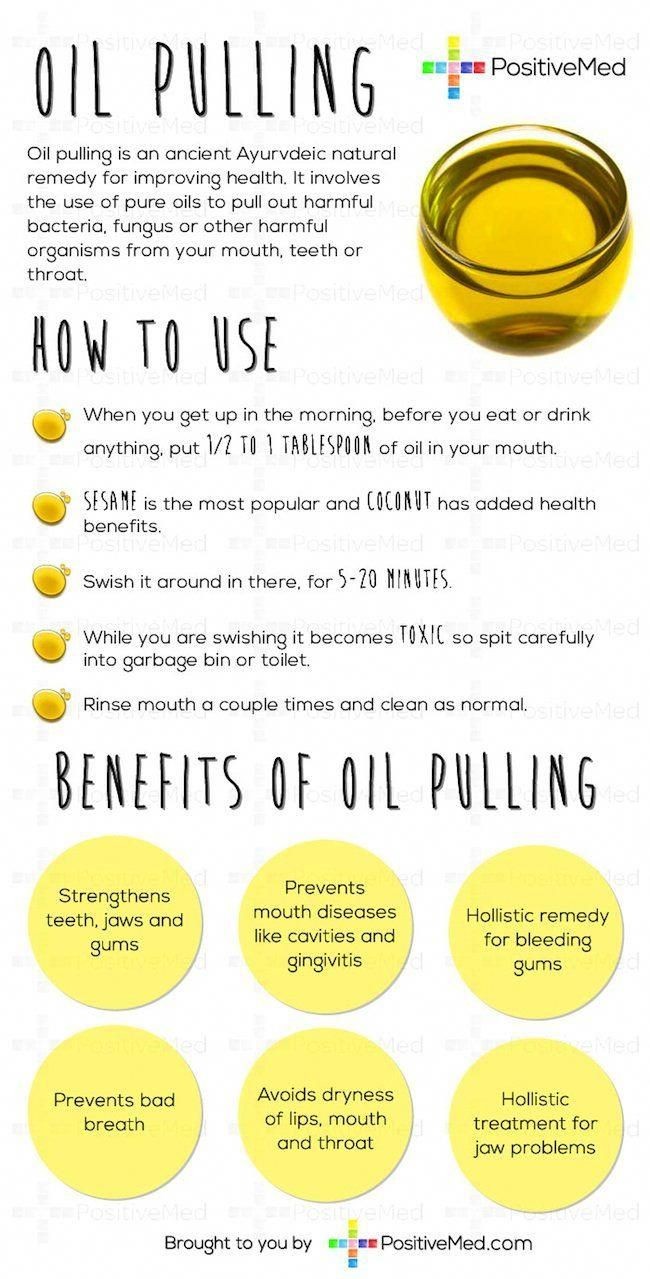
Oil Pulling: What Happens and Is It Good to Do Everyday?
Oil pulling is using oil to clean your mouth and is believed to improve oral and dental health. It’s a simple process that can be part of your daily routine and greatly improve oral health.
Oil pulling is a technique recommended by Ayurveda, an ancient Indian medicinal system. It has been used for centuries in India and Southeast Asia.
To do oil pulling, swish one tablespoon of oil in your mouth for one to five minutes or longer. This motion helps improve dental health.
Coconut oil is the most common oil used for oil pulling, followed by sesame and olive oil. Some people also use sunflower oil.
While oil pulling originated in India, it has become popular worldwide due to its positive effects on oral and overall health.
Oil pulling is similar to using mouthwash, but with edible oils, it carries no known risks when used in the mouth.
How to do oil pulling
When doing oil pulling, it is important to use quality oils, such as coconut or sesame oil.
The best time for oil pulling is in the morning on an empty stomach, before breakfast. Swish one tablespoon of oil in your mouth for about 20 minutes.
Children above five years old can also do oil pulling, starting with one teaspoon of oil. Swish the oil around the mouth, focusing on the gaps between the teeth.
After 20 minutes, the oil becomes a viscous milky liquid and should be spit out. Rinse the mouth with tap water or warm saline water, then brush your teeth.
If your jaw hurts during oil pulling, reduce the swishing time and gradually increase it as you become more comfortable.
Spit the oil into a trash can or paper towel, as spitting into the sink may cause clogs. Avoid swallowing the oil, as it contains bacteria and waste that should be removed from the body.
Children under five should not do oil pulling due to the risk of aspiration, which can cause breathing difficulties.
Oil pulling is beneficial for maintaining oral hygiene, especially if you have oral ulcers, fever, a tendency to vomit, or asthma.
May remove harmful bacteria
Your mouth harbors around 700 types of bacteria, some of which can cause dental problems like tooth decay, bad breath, and gum disease.
Studies have shown that oil pulling reduces the amount of bacteria in the saliva and improves oral hygiene. It is equally effective as using commercial mouthwashes containing chlorhexidine.
In a study, one group used coconut oil for 10 minutes, another used chlorhexidine for one minute, and a third group used distilled water for one minute before brushing their teeth. Oil pulling with coconut oil showed the same results as chlorhexidine mouthwash.
Another study with adolescent children found that oil pulling with sesame oil for one week reduced harmful bacteria in the saliva and plaque.
Could reduce bad breath
Halitosis, or bad breath, is often caused by bacteria on the tongue’s uneven surface. Oil pulling effectively improves breath quality and can be a natural alternative to other methods.
A study found that oil pulling reduces instances of halitosis and can replace existing bad odor remedies.
May lower inflammation and improve gum health
Oil pulling with coconut oil has anti-inflammatory properties that improve gum health and reduce inflammation.
It also lowers harmful bacteria and plaque, which can cause gum disease like gingivitis.
A study involving 60 participants who used coconut oil for 30 days showed improved gum health and reduced plaque levels.
QUESTION
Could prevent cavities
Cavities are caused by tooth decay, usually due to poor oral hygiene, high sugar intake, and bacterial buildup.
Research has shown that oil pulling reduces bacteria in the mouth and prevents tooth decay. It is as effective, if not more, than using mouthwash to counter harmful bacteria in saliva and plaque.
Other benefits of oil pulling
Oil pulling helps combat various other conditions. Coconut oil’s antifungal properties can counter yeast infections caused by Candida albicans in the mouth.
Coconut oil is as effective as fluconazole, an antifungal medicine, in treating such infections.
Oil pulling is also an inexpensive way to improve dental hygiene. Sesame oil’s polyunsaturated fatty acids lower the harmful effects of free radicals in the mouth.
Olive oil has anti-inflammatory properties, while coconut oil has antifungal properties.
Using sunflower oil for oil pulling inhibits plaque-induced gingivitis.
Overall, oil pulling is a simple and effective method to improve oral health.
Can oil pulling be done every day?
Studies have shown the positive effects of oil pulling with various oils. It improves oral and dental health, reduces inflammation, overcomes bad breath, prevents cavities, and inhibits harmful bacteria.
Oil pulling is a great way to improve dental health, but it should be done in addition to traditional dental hygiene practices. Consult your doctor for the best course of action if you have dental problems.


